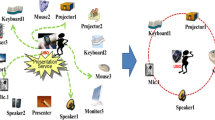Abstract
In an Internet of Things (IoT) environment, service composition and collaboration among heterogeneous resources are required. Thus, an infrastructure that supports these requirements is an essential factor in a seamless service delivery. For these requirements, mobile devices should have multiple functions. However, the miniaturization of mobile devices is another requirement, and a trade-off between the two requirements is naturally generated. My previous study proposed the resource collaboration system that provides a service consisting of shareable resources in the surrounding area to solve the resource limitations of devices. Reducing the processing time for generating the recommendation and improving user satisfaction about the results are important factors, particularly for a small mobile device with limited resources. This study analyzes and classifies personal user preferences from resource usage history based on the Myers-Briggs type indicator. The study also proposes a method to recommend customized resources for classified user types. Results show that the proposed method reduces the recommendation time and increases user satisfaction.










Similar content being viewed by others
References
Adomavicius G, Mobasher B, Ricci F, Tuzhilin A (2008) Context-aware recommender systems. In: Proceeding of the 2008 ACM conference on recommender systems, Lousanne, Switzerland. pp 217–253. doi:10.1007/978-0-387-85820-3_7
Bhatia M, Sood SK (2017) Internet of Things based activity surveillance of defence personnel. J Ambient Intell Hum Comput. doi:10.1007/s12652-017-0507-3
Gasmi I, Seridi-Bouchelaghem H, Hocine L, Abdelkarim B (2015) Collaborative filtering recommendation based on dynamic changes of user interest. Intell Decis Technol 9(3):271–281. doi:10.3233/IDT-140221
Gubbi J, Buyya R, Marusic S, Palaniswami M (2013) Internet of Things (IoT): a vision, architectural elements, and future directions. Future Gener Comput Syst 29:1645–1660. doi:10.1016/j.future.2013.01.010
Ha SH (2006) Digital content recommender on the internet. IEEE Intell Syst 21(2):70–77
Hernandez-Ramos JL, Moreno MV, Bernabe JB, Carrillo DG, Skarmeta AF (2015) SAFIR: secure access framework for IoT-enabled services on smart buildings. J Comput Syst Sci 81(8):1452–1463. doi:10.1016/j.jcss.2014.12.021
Lee MC, Jang HK, Paik YS, Jin SE, Lee S (2006) Device collaboration framework in ubiquitous environment: celadon. In: Proceeding of SEUS-WCCIA’06, Gyeongju, Korea
Liu H, Kong X, Bai X, Wang W, Bekele TM, Xia F (2015) Context-based collaborative filtering for citation recommendation. IEEE Access 3:1695–1703. doi:10.1109/ACCESS.2015.2481320
McFaddin S, Coffman D, Han JH, Jang HK, Kim JH, Lee JK, Lee MC, Moon YS, Narayanaswami C, Paik YS, Park JW, Soroker D, (2007) Celadon: delivering business services to mobile users in public spaces. IBM research report RC24381(W0710-101)
Myers IB, McCaulley MH, Quenk NL, Hammer AL (1998) Manual: a guide to the development and use of the Myers-Briggs type indicator, 3rd edn. Consulting Psychologists Press, Palo Alto. (ISBN 0-89106-130-4)
Park JH (2010) A recommender system for device sharing based on context-aware and personalization. KSII Trans Internet Inf Syst 4(2):174–190. doi:10.3837/tiis.2010.04.006
Park JH, Kang JH (2010) Resource collaboration system based on dynamic user preference and context. J Artif Intell Rev 34(3):217–287. doi:10.1007/s10462-010-9175-9
Rana S, Jain SK (2012) A study of the dynamic features of recommender systems. J Artif Intell Rev 43(1):141–153. doi:10.1007/s10462-012-9359-6
RDF 1.1 Primer (2014) W3C Working Group Note, 24 June 2014. https://www.w3.org/TR/rdf11-primer/
Saggino A, Kline P (1996) The location of the Myers-Briggs type indicator in personality factor space. Pers Indiv Differ 21(4):591–597. doi:10.1016/0191-8869(96)00009-8
Schmidt A (2010) Ubiquitous computing: are we there yet? Computer 43(2):95–97. doi:10.1109/MC.2010.54
SPARQL 1.1 Query Language (2013) W3C Recommendation, 21 March 2013. https://www.w3.org/TR/sparql11-query/
Spoladore D, Modoni G, Sacco M (2016) Smart devices for the home of the future: a new model for collaboration. ERCIM News 2016(104):48–49
Xu L, He W, Li S (2014) Internet of things in industries: a survey. IEEE Trans Ind Inf 10:2233–2243. doi:10.1109/TII.2014.2300753
Zang Y, An Y, Hu XT (2014) Automatically recommending healthy living programs to patients with chronic diseases through hybrid content-based and collaborative filtering. In: Proceeding of BIBM 2014, Belfast, United Kingdom. pp 578–582. doi:10.1109/BIBM.2014.6999224
Zanker M, Ricci F, Jannach D, Terveen L (2010) Measuring the impact of personalization and recommendation on user behaviour. Int J Hum Comput Stud 68(8):469–471. doi:10.1016/j.ijhcs.2010.04.002
Acknowledgements
This work was supported by the National Research Foundation of Korea Grant funded by the Korean Government [NRF-2014R1A1A2057221].
Author information
Authors and Affiliations
Corresponding author
Rights and permissions
About this article
Cite this article
Park, JH. Resource recommender system based on psychological user type indicator. J Ambient Intell Human Comput 10, 27–39 (2019). https://doi.org/10.1007/s12652-017-0583-4
Received:
Accepted:
Published:
Issue Date:
DOI: https://doi.org/10.1007/s12652-017-0583-4




